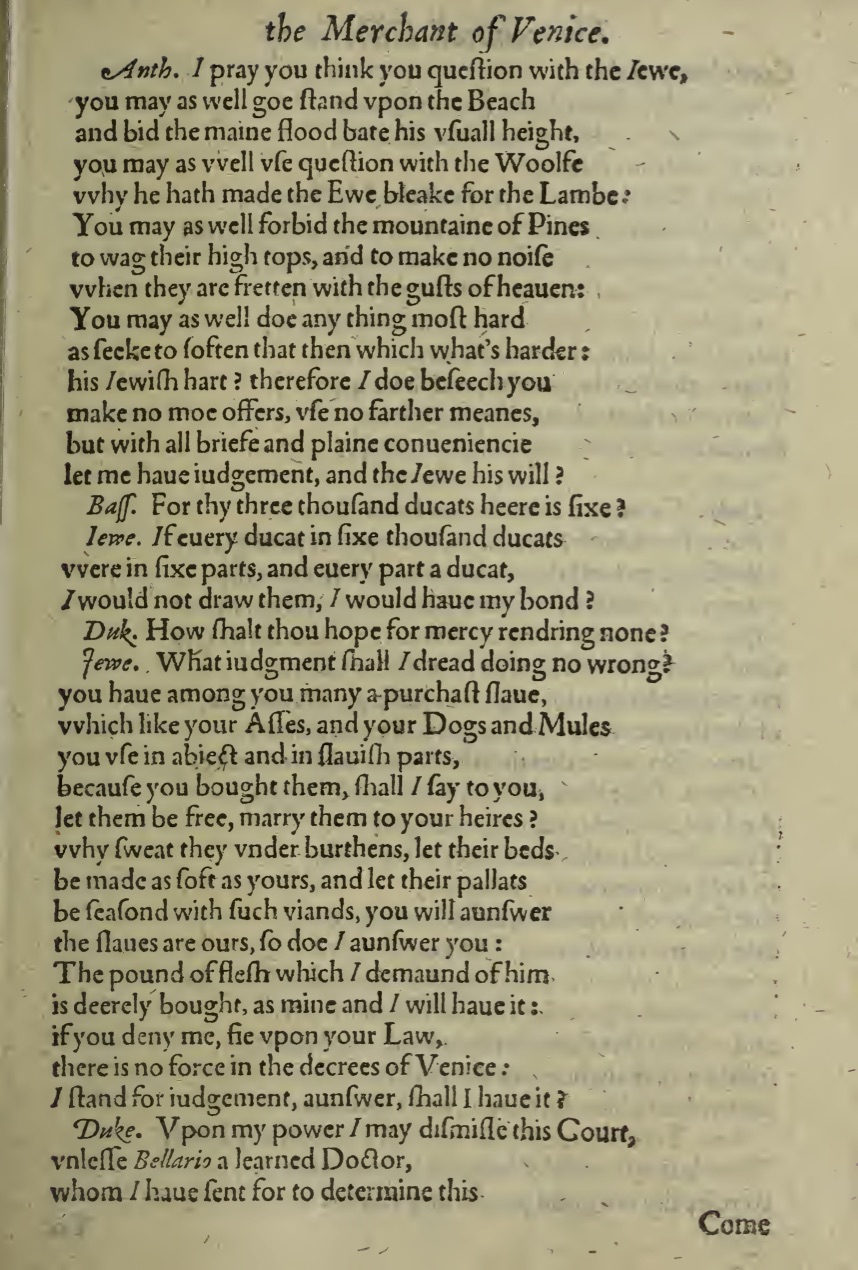Editorial note
The main goal of this transcription was to create a version of the text that was more accessible and digestible to modern readers. This involved many grammatical changes, such as taking the early modern English spellings of the original and changing the orthographic characters that are different from present day English words. Words like ‘queftion’ become ‘question,’ and ‘vvhy’ becomes ‘why.’ Shakespeare also chose to capitalize certain words like ‘Dogs” and “Pines,’ which we’ve made lowercase for the sake of fitting into modern grammatical rules. At the same time, the first words of each line are capitalized to signify a new line being started. We’ve also made minor changes to punctuation in order to keep pauses while making sure the text still flows.
Due to the fact that this transcription is supposed to be for present-day readers to look at, it was fitting to change the use of ‘Iewe’ as Shylock’s name to ‘Shy.’ This is due to the antisemitic nature of labeling Shylock only as ‘Iewe’ while displaying the names of other characters in the scene. The abbreviations of Antonio and Bassiano’s names have also been changed to fit their modern counterparts as well.
Multiple footnotes have been added too in order to give more context to what each character is saying. Religious references to the ‘Ewe’ and ‘Lamb’ are added to aid those who may not know of them, along with definitions of uncommon words. The last three lines of the original text are omitted as well, since the Duke’s response isn’t complete and clashes with the main scene on the page.
Updated Glossing & Key
Glossing Changes Key:
- dropped 'e'
- dropped 'e' & 'o'
- dropped 'h'
- dropped 'i'
- dropped 'r'
- dropped 'u'
- changed orthographic characters
- added orthographic characters
- de-italicization
- de-capitalization
- capitalization
Updated Glossing:
Ant. I pray you think you question with the Jew,
You may as well go stand upon the beach
You may as well use question with the Wolf
Why he hath made the Ewe bleak1 for the Lamb2—
You may as well forbid the mountain of pines
To wag their high tops, and to make no noise
When they are fretten3 with the gusts of heaven—
You may as well do any thing most hard
As seek to soften that then which what’s harder.
His Jewish heart? Therefore I do beseech you
Make no more offers, use no farther means,
But with all brief and plain convenience
Let me have judgement, and the Jew his will?
Bass. For thy three thousand ducats here is fix?
Shy.4 If every ducat in fix thousand ducats
Were in fix parts, and every part a ducat,
I would not draw them, I would have my bond?
Duke How shalt thou hope for mercy rend’ring none?
Shy. What judgement shall I dread doing no wrong?
You have among you many a purchas’d slave,
Which like your asses, and your dogs and mules
You use abject5 and in slavish parts,
Because you bought them, shall I say to you,
Let them be free, marry them to your heirs?
Why sweat they under burthens6, let their beds
Be made as soft as yours, and let their pallets
Be season’d with such viands7, you will answer
The slaves are ours, so do I answer you:
The pound of flesh which I demand of him
Is dearly bought, as mine and I will have it.
If you deny me, fie8, upon your Law,
There is no force in the decrees of Venice:
I stand for judgement, answer, shall I have it?9
Image credit: Rare Books & Manuscripts Department, Boston Public Library, copy G.176.16. The most excellent historie of the merchant of Venice. First Quarto. London: 1600.
Citing this page: Shakespeare, William. The Merchant of Venice, G4r. London: 1600. Cacodemon Digital Shakespeare. Edited by [J. Brooke Buczek and Lauren Canney]. Source edition: Rare Books & Manuscripts Department, Boston Public Library (copy G.176.16). http://cacodemonshakespeare.com/comedies/merchant/g4r.
Notes
1 Possibly 'bleak', meaning "to grow pale" or its alternative form, "to blacken, darken" ("bleak v.I.2", "bleak v.III.4"); possible also an alternative spelling of 'bleat', meaning "to cry, as a sheep, goat, or calf" ("bleat v.1.a").
2 Imagery of Judaism and Christianity as displayed as separate and in opposition. 'Ewe' is linked to Judaism and punned off of the first syllable in 'usury', which is likewise associated with Judaism. 'Lamb' is associated more with Christianity (though it does show up as a prominent term in the Hebrew Bible), in that Jesus Christ is often described as the sacrificial 'Lamb of God'.
3 Chafed or irritated (“fret, v¹.8”).
4 Changed to 'Shy.'—an abbreviation of Shylock, instead of referring to him as just "Jewe" as in the original text.
5 "Cast off"; "wretched", "servile"; "of low status" (“abject, adj.1, adj.2.a, adj.2.b”).
6 'Burþen', variant of 'Burden': A load, particularly of labor; a load that is laborious; "duty, responsibility, blame, sin, sorrow" (“burden, n.I.2.a”).
7 food, rations, provisions (“viand, n¹.1.a”).
8 An exclamation commonly used to express "disgust or indignant reproach" (“fie, int.1”).
9 The last three lines of the original page are omitted from this modern glossing as they are part of the Duke's speech continuing onto the next page. Keeping them would have provided incomplete context, as well as the potential for differences in glossing styles to conflict in the interpretation of the original text.
Additional Citations:
“abject, adj.1, adj.2.a, adj.2.b” Oxford English Dictionary, Oxford University Press, July 2023, https://doi.org/10.1093/OED/2196094487.
“bleak, v.I.2, v.III.4” Oxford English Dictionary, Oxford University Press, September 2023, https://doi.org/10.1093/OED/2426557584.
“bleat, v.1.a” Oxford English Dictionary, Oxford University Press, July 2023, https://doi.org/10.1093/OED/8631703140.
“burden, n.I.2.a” Oxford English Dictionary, Oxford University Press, September 2023, https://doi.org/10.1093/OED/6442538297.
“fie, int.1” Oxford English Dictionary, Oxford University Press, July 2023, https://doi.org/10.1093/OED/1082437274.
“fret, v¹.8” Oxford English Dictionary, Oxford University Press, July 2023, https://doi.org/10.1093/OED/1193493272.
“viand, n¹.1.a” Oxford English Dictionary, Oxford University Press, September 2023, https://doi.org/10.1093/OED/5664772252.
